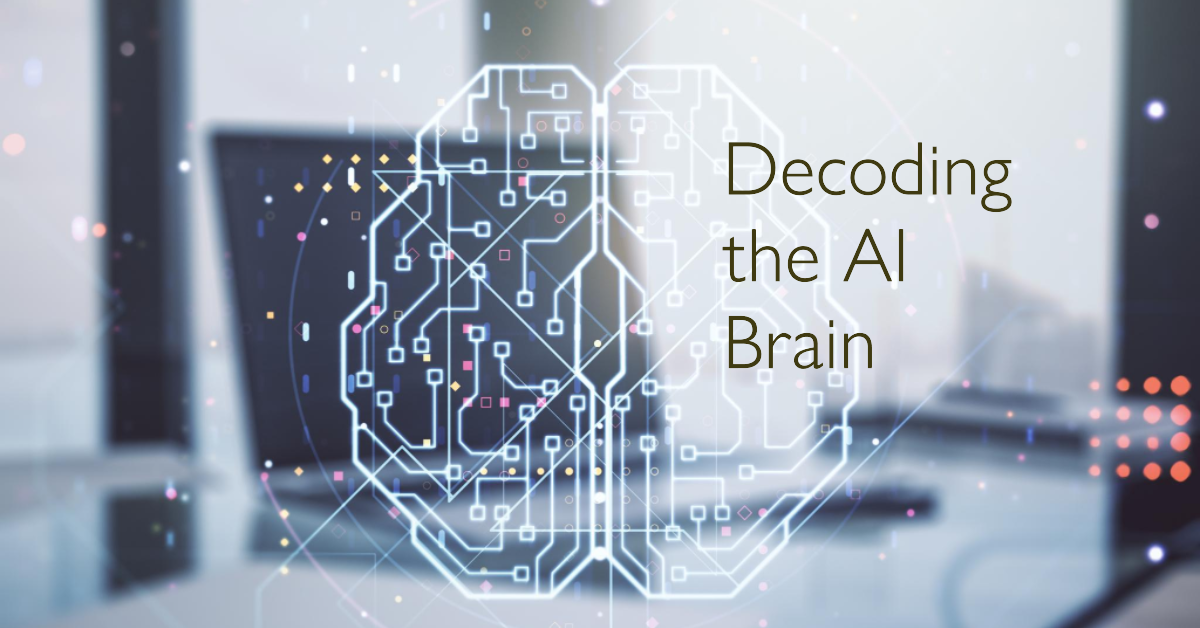Decoding the AI Brain: Does It Really Think Like Us?
In this blog, we explore the fascinating realm of AI decision-making and question whether AI truly thinks like humans. Delving into the intricacies of neural networks, we uncover the limitations of AI compared to human intelligence, including context understanding, creativity, and ethical judgment. While AI has made tremendous strides, it lacks consciousness and emotions. The blog discusses the future of AI, touching upon explainable AI, ethical considerations, and the potential of hybrid approaches that combine human and artificial intelligence. Understanding these nuances is crucial for responsible AI implementation and unleashing its power in synergy with human intellect.

Artificial Intelligence (AI) has made remarkable strides in recent years, revolutionizing industries and transforming the way we live, work, and interact. As AI technologies become increasingly sophisticated, questions about the essence of AI decision-making arise. Do these algorithms merely mimic human intelligence, or do they possess a consciousness akin to ours? In this blog, we will delve into the intricacies of AI decision-making and explore whether AI truly thinks like us.
Understanding AI Decision-making
AI systems are designed to analyze vast amounts of data, recognize patterns, and make decisions based on learned patterns and rules. They rely on mathematical algorithms and neural networks to process information, but do they truly "think" as humans do?
While AI systems can emulate human-like behavior, it is essential to recognize that their "thinking" process differs significantly from human cognition. Unlike humans, AI lacks consciousness, emotions, and self-awareness. AI makes decisions based solely on data and predefined rules, without subjective experiences or an understanding of the consequences of its actions.
The Limitations of AI Decision-making
AI excels in processing vast datasets and making rapid calculations, far surpassing human capabilities in terms of speed and accuracy. However, AI is limited in several crucial aspects that define human intelligence.
-
Context and Understanding: AI lacks the inherent ability to grasp context and the true meaning of information. While AI can recognize patterns, it does not possess the human capacity to understand the complexities of language or subtle nuances that shape decision-making.
-
Creativity and Imagination: Unlike human creativity, which stems from complex emotions and experiences, AI's "creativity" is a result of manipulating data based on patterns it has learned. AI can mimic creative outputs, but it does not experience true inspiration or original thought.
-
Morality and Ethical Judgment: AI decisions are governed solely by the data it has been trained on and the rules defined by its creators. It does not possess an inherent sense of morality or ethical judgment, making it incapable of making value-based decisions.
The Neural Networks Analogy
To understand the intricacies of AI decision-making, let's draw an analogy to neural networks—the foundation of modern AI algorithms. Neural networks consist of interconnected nodes (artificial neurons) that process and transmit information. This interconnectedness allows AI to recognize patterns and make decisions, mimicking the way our brain's neurons function.
While this analogy provides a framework for AI decision-making, it is vital to remember that neural networks are mere mathematical abstractions. They lack the complexity of the human brain and do not possess cognitive abilities like consciousness or self-awareness.
The Future of AI Decision-making
As AI continues to evolve, researchers and engineers are exploring ways to improve AI decision-making and bridge the gap between human and artificial intelligence. Some promising areas of research include:
-
Explainable AI: Efforts are underway to make AI decision-making more transparent and interpretable. Explainable AI aims to provide clear explanations for AI decisions, helping us understand the reasoning behind their choices.
-
Ethical AI: Building ethical considerations into AI systems is critical to ensuring responsible decision-making. This involves designing AI algorithms that prioritize fairness, accountability, and transparency.
-
Hybrid Approaches: Combining human and AI decision-making can leverage the strengths of both systems. Humans can provide context, moral judgment, and creative insights, while AI can process vast amounts of data and identify patterns quickly.
Conclusion
While AI decision-making has come a long way and is incredibly powerful in processing data and recognizing patterns, it still falls short of replicating human intelligence. AI lacks consciousness, emotions, and ethical judgment, making it fundamentally different from human thinking.
As we continue to unlock the potential of AI, we must also remain aware of its limitations. By understanding the boundaries of AI decision-making, we can harness its power responsibly, integrating it with human intelligence to address complex challenges and create a better future for humanity. Ultimately, the journey to decode the AI brain is as much about understanding ourselves as it is about understanding the machines we create.
ALSO READ
Norway's Wealth Fund Divests from Bezeq Over Ethics Concerns
Justice Gorsuch Bows Out: Ethics Questions Surround Utah Railway Case
Congressional Dispute Over Release of Gaetz Ethics Report
House rejects Democratic effort to force release of Matt Gaetz ethics report, reports AP.
House rejects Democratic effort to force release of Matt Gaetz ethics report, reports AP,










